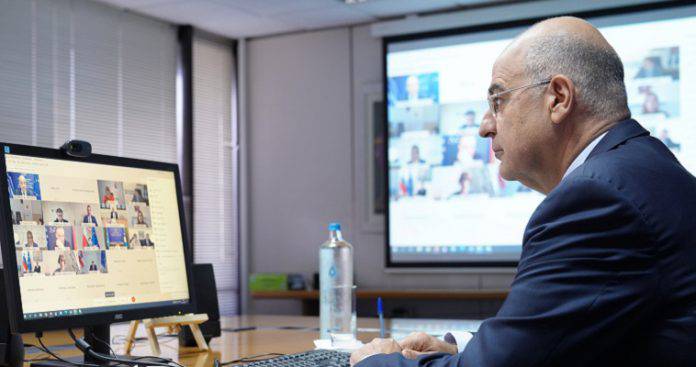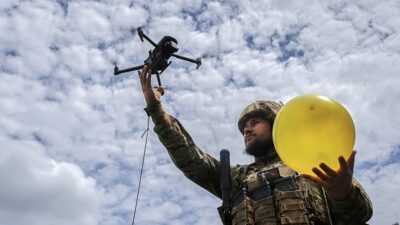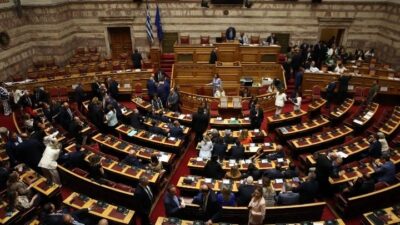Stavros Lygeros: What EU Foreign Ministers said about Turkey – The German and Spanish maneuvering
27/11/2020
The contradictory attitude of the EU towards Turkey is reflected in what was said at the EU Foreign Ministers teleconference on 19 November, the main topic of which was relations with Turkey. While most foreign ministers used harsh language, the term “sanctions” was not heard. Everyone, without exception, preferred the term “restrictive measures”, which refers to a much milder stance. It should be noted that the EU uses the term “sanctions” for Russia. Also, nothing was heard about the freezing of the delivery of weapons systems to Turkey, which was supposed to enter the table.
SLpress.gr exclusively publishes what exactly was said in the teleconference by those who spoke. Impressive, however, was the resounding silence of the German and Spanish ministers, whose governments, aided by others, are leading the way behind the scenes for softer handling of Turkey at the upcoming summit. The Portuguese, the Swedes, the Finns, and the Eastern European ministers were also silent about the Eastern Mediterranean.
It is noteworthy that the Germans and the Spaniards (and the Portuguese and the Slovenes) spoke only to suggest that the issue of Turkey be included in the EU-US dialogue. In fact, it is a diplomatic maneuver, intended to be used as a pretext for the forthcoming Summit in order to freeze EU action against Turkey in the name of the need to coordinate with Washington.
Borel’s suggestion to the EU Foreign Ministers
EU High Representative Borrell was the first to speak, calling Erdogan’s visit to Varosha “provocative”. He informed the ministers that he had called the Turkish Cypriot leader Tatar to tell him that the EU was in favor of a bi-zonal federation. As he said, he received the answer that the Turkish side is in favor of the two-state solution. Borrell argued that the EU should support the resumption of talks on the Cyprus issue on the basis of the “Crans Montana negotiating acquis”.
Referring to the Eastern Mediterranean, Borrell said that the forthcoming summit on December 11th will discuss EU policy towards Turkey. He informed ministers about his efforts to convene a multilateral conference on the Eastern Mediterranean, considering that he has received a relevant mandate from the European Council.
He said he envisioned the conference as a “political conference” with the participation of international organizations and directly involved parties, but acknowledged that there was a lack of enthusiasm for his idea. He concluded by saying that Turkey has exhausted the opportunities to be rewarded by the EU with positive measures and now has to prove in practice that it sincerely wants to cooperate with the EU.
What the French, the Austrian, and Dendias said
The French Foreign Minister pointed out that at the October Summit, the leaders decided on a positive agenda in the context of EU-Turkey relations, but under certain conditions. That is why, at the same time, they have adopted restrictive measures in case Ankara continues its unilateral provocative actions.
As he said, after October, Turkey is escalating with hostile, not just provocative actions. Ankara’s campaign against so-called Islamophobia in France and Europe, as well as the personal attacks on President Macron, have posed a serious national security problem for France. Therefore, action by the EU “and pressure with appropriate restrictive measures” are required. Otherwise – the French minister concluded – the credibility of the EU is at stake, something that France will not allow. The Austrian Foreign Minister fully agreed with his French counterpart.
Dendias recalled that at the October European Council, the EU offered a “positive agenda” to Turkey, provided it accepted EU mediation and de-escalated its provocations towards Greece and Cyprus. Instead, Greece faces ongoing illegal Turkish Navtex and violations of its sovereign rights.
Dendias underlined, in fact, that in one case this Greek national sovereignty was also violated. Apparently, he was referring to the fact that a Turkish Navtex entered Greek territorial waters (5.8 miles from the coast) in the area of Kastellorizo. He concluded by saying that Erdogan’s picnics in Varosha could not be tolerated by the EU. There was no room for reflection on a “positive agenda”. The EU should have already taken action against Turkey, based on existing proposals.
What the Cypriot, the Italian, and the Estonian ministers said
The Cypriot Foreign Minister referred to the settlement of Varosha and the ongoing drilling and seismic surveys in the Cypriot EEZ. He stressed that Turkey has realized that the EU is allowing it to violate international law to the detriment of its member states and he is taking advantage of it. He concluded by saying that Cyprus expects the forthcoming European Council to evaluate Turkey’s behavior and reach applicable measures.
The Italian minister informed that he had two recent talks with his Turkish counterpart and during these, he sent him the appropriate messages. He said Italy condemned unilateral actions and unacceptable characterizations of European leaders. He described the recent Turkish actions in Varosha as completely condemnable, calling for a permanent solution to the Cyprus problem. He concluded by saying that all parties (an indirect equation of perpetrator-victim!) should work in the Eastern Mediterranean to de-escalate tensions, adding that the multilateral conference was an appropriate forum.
The Estonian minister said he was concerned about Turkey’s behavior in the Eastern Mediterranean, expressing solidarity with Greece and Cyprus. He concluded by saying that the Turkish behavior in Varosha and the de facto creation of a second state in Cyprus should be of serious concern to the European Council. The Irish Minister also expressed his disappointment with the Turkish actions in the Eastern Mediterranean and Varosha, emphasizing that Turkey has rejected the EU offers and continues to provoke. The EU must therefore respond.
The EU and Nagorno-Karabakh
The Dutch minister called for a moratorium on arms exports to Turkey over its actions in Nagorno-Karabakh, Syria, and Libya. He did not find a word to say about what he is doing to the detriment of Greece and Cyprus! The Luxembourg Foreign Minister was also fiery against Turkey over Nagorno-Karabakh. He accused Turkey of being a warmonger, of taking part in hostilities with Syrian mercenaries and drones, calling the incident unacceptable. He even expressed the view that Biden’s election would put an end to Erdogan’s impunity and suggested that the EU should appeal to the US President-elect.
For the Nagorno-Karabakh war, France, Austria, Greece, Cyprus, the Netherlands, Luxembourg, Portugal, Finland, and Sweden have called for a clarification of Turkey’s role in the ceasefire agreement. At the same time, Eastern European ministers and their Swedish counterpart expressed concern about the growing Russian influence in the Caucasus.
During this teleconference, an exchange of views took place with the Palestinian Foreign Minister, while “multilateralism” was also discussed, as well as the need for unity of the Member States in international organizations. Operation IRINI in the Mediterranean, the situation in Libya, and the strengthening of sanctions in Belarus were also discussed.





